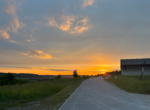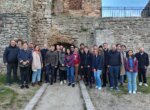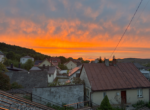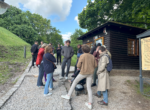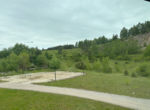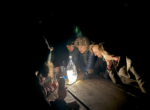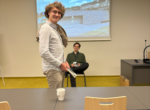MSD symposium 2025
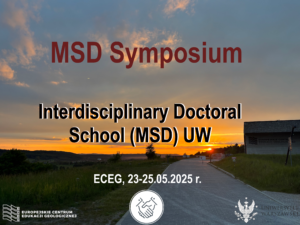
On 23-25 May 2025, some thirty doctoral students of the UW Interdisciplinary Doctoral School travelled to the European Centre for Geological Education in Chęciny for the annual symposium on themes and problems of interdisciplinarity in academic and scientific communities. This time, the paper and seminar offerings were significantly expanded: namely, they were enriched by three mentoring talks, two workshops (conservation and dance) and a talk on internationalisation led from the important, inclusive perspective of foreign doctoral students at MSD. While many of the activities were groundbreaking and arguably inspirational, there was no shortage of classic papers, presented in installments in which MSD doctoral students shared the results of their work or academic fascinations shaped on the margins of their emerging dissertations. Friday’s peloton of papers opened with Antoni Grześczyk, interestingly but also – fractally – considering the influence of alchemical inspirations on the foundations of economic theory. Joanna Surma continued – in an exhaustive, open and attractive manner, reviewing the key diseases of the middle ear – as the review would shape the judgement of today’s ENT specialists.
After lunch, we continued our reflections with a brilliant analysis by Piotr Biegański considering models of science evaluation systems in the light of unfavourable consequences for them, such as the promotion of methodological practices that are flawed for the university. The final element of Friday’s discussions was a panel – prepared by Yasser Salimi Namin in collaboration with Alyaxey Yaskevich and Shubhangi Rawat – on the internationalisation of the University of Warsaw. The School’s foreign-language doctoral students made the other MSD audience aware of the vast area of good practices that are still to be implemented so as to optimally enhance the quality of international doctoral education. Our community concluded Friday evening with an inclusive bonfire.
Saturday morning belonged to mentors Dr Iwo Zmyślony and Prof Joanna Trzeciak Huss (Kent State University). We discussed creativity in the empirical sciences, tacit knowledge, phronesis, synderesis, the crisis in American higher education, and the rich interdisciplinary offerings present in higher education – which remain high despite the crisis. The morning session concluded with Yasser Salimi Namin considering contemporary images of Islam in literature – starting with Salman Rushdie’s The Satanic Verses and ending with Michel Houellebecq’s Submission. The highlight of the afternoon’s discussion programme, it seems, was Sylvia Svorova Pavlovich’s – non-obvious and innovative – conservation workshop, entitled “Science meets art – unmasking Islam”. Science meets art – unmasking the fake, introducing the work of a conservator in recognising forgeries on the art market, especially those penetrating from the free market area into the quality-regulated area of museology. To conclude a day rich in scientific events, the last paper was presented by Daniel Bator, drawing the audience’s perspective on the far-reaching consequences of the abolition of the Church Fund for minority churches and non-denominational denominations in Poland. The late afternoon and evening were spent by the School’s doctoral students visiting the castle in Chęciny and integrating artistically: we talked about the translation work of Joanna Trzeciak Huss and the literary work of Karol Samsel.
Sunday was a rather important complement to Friday and Saturday’s repertoire of topics and issues. An excellent dance workshop by Izabela Andrzejak, our doctoral student and a dancer with the State Folk Song and Dance Ensemble “Mazowsze”, focused in its theoretical part on the institution and idea of the dance house, while the practical part was – especially for foreigners – an experiment of experiencing the body in the movement of folk dance (we practised, among other things, the Polish oberek). The symposium culminated with a third mentoring talk – with Professor Ewa Solska, working in the Department of Digital Humanities and Methodology of History at the Maria Curie-Skłodowska University. We considered themes of meta-science in relation to the Polish academic situation, in light of the most important Polish and international thematic readings of recent years, such as Bill Readings’ The University in Ruins.
